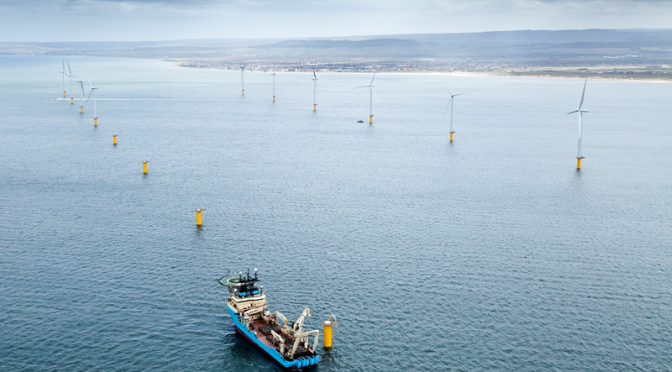A 110-foot long lift vessel will periodically be located off the shore of Camp Pendleton during July to obtain core samples needed for Dominion Virginia Power to move ahead with its proposal to build wind turbines 27 miles off the coast.
The U.S.-flagged Inez Eymard literally lifts itself out of the water to provide a stable platform for collecting the core samples. As weather permits, the vessel will conduct borings off Camp Pendleton during July. The vessel’s location will range from 300 to 3,300 feet from the shoreline while collecting data for the design of the underground electric distribution line.
“This proposed project provides a very interesting opportunity to develop renewable offshore wind energy for Virginia,” said Paul Ruppert, senior vice-president of Business Development and Generation Construction. “Both the demonstration project and the commercial venture tie into our strategy of promoting a diverse generating mix that includes nuclear, natural gas, coal, hydro, solar and sustainable wind while providing our customers with reliable and affordable electricity.”
The Inez Eymard, which usually works in the Gulf of Mexico, has spent the past few days working at both Camp Pendleton and at the turbine site 27 miles off the coast of Virginia Beach.
Dominion has received two Department of Energy grants totaling $51 million for its wind turbine demonstration project. If the project is approved, the company plans to build two 6-megawatt turbines and test design features intended to lower the cost of construction, reduce maintenance and withstand hurricane-force winds. Click here: www.dom.com/wind.
Dominion also holds the lease on 112,800 acres of commercial wind area adjacent to the demonstration project. The company intends to use lessons learned from the demonstration turbines to guide the development of up to 2,000 megawatts of wind turbine energy.
To develop the demonstration project, Dominion is working with a team of national and international organizations recognized for their offshore expertise. The team includes: Alstom Power Inc., a wind turbine manufacturer and major supplier of equipment and services to the global power generation market; KBR, a global engineering, construction, and services firm with experience in offshore wind; and the Commonwealth of Virginia Department of Mines, Minerals and Energy, which will hold the lease on the demonstration site.
Additional partners include the National Renewable Energy Laboratory, the U.S. Department of Energy’s primary national laboratory for renewable energy and energy efficiency research and development; Virginia Tech Advanced Research Institute, representing the Virginia Coastal Energy Research Consortium; Keystone Engineering, Inc. developer of the turbine foundation; Tetra Tech Inc., an environmental consultant; and Newport News Shipbuilding, a division of Huntington Ingalls Industries.
The four borings at the turbine site will be collected approximately 330 feet below the ocean floor. The samples will be used to determine soil characteristics – such as composition and strength – to finalize the design of the wind turbine foundations.
Near shore, the vessel has finished two borings and has nine more to complete. The samples will be used to finalize the installation plan of the underground distribution line that will run from the turbines to Camp Pendleton, where they will be connected to Dominion’s electrical grid. Each of these borings will be obtained approximately 80 feet below the ocean floor.
Dominion still needs to obtain several regulatory approvals. Based on approval by mid-2016, major construction would occur in 2017 and the wind turbines would begin operating later that year.
Dominion (NYSE: D) is one of the nation’s largest producers and transporters of energy, with a portfolio of approximately 23,600 megawatts of generation. Dominion operates one of the nation’s largest natural gas storage systems and serves utility and retail energy customers in 10 states.
http://santamarta-florez.blogspot.com.es/2014/07/dominion-using-research-vessel-to.html


